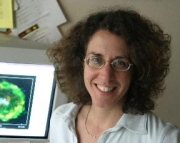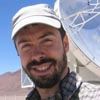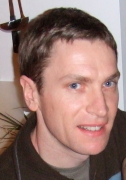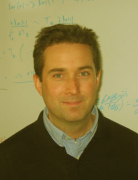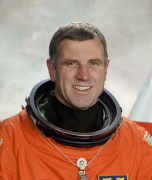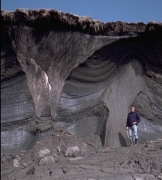 McGill Mini-Science 2009
McGill Mini-Science 2009
TO INFINITY AND BEYOND:
SPACE, STARS & THE UNIVERSE
Here are short biographies for this year's Mini-Science lecturers:
- Prof. Victoria M. Kaspi
- Prof. Matt Dobbs
- Prof. Tracy Webb
- Prof. Andrew Cumming
- Prof. Robert E. Rutledge
- Dr. Dave Williams
- Prof. Wayne Pollard
Prof. Victoria M. Kaspi
Neutron Stars: Lighthouses of the Cosmos
April 1, 2009
Renowned astrophysicist Professor Kaspi sheds light on cosmic mysteries and has built an academic program from scratch. Her research is in astrophysics - specifically on an exotic type of star called a pulsar. Along with her research team, she uses "the world's largest telescopes, both ground- and space-based, to study these amazing objects!"
Professor Kaspi is a Professor of Physics in the Department of Physics, the Lorne Trottier Chair in Astrophysics and Cosmology, the Canada Research Chair in Observational Astrophysics and was recently elected a Fellow of the Royal Society of Canada.
Having graduated from McGill with a B.Sc. (1989), Professor Kaspi went on to complete an M.A. (1991) and Ph.D. (1993) in Physics at Princeton. She returned to McGill from M.I.T. to accept a professorship and to found the Pulsar Group in the Physics Department. Under her direction, McGill has become the country's locus of high-energy astrophysics research. Since returning to McGill, Professor Kaspi has earned a constellation of major awards: the Steacie Prize in the Natural Sciences, the Rutherford Memorial Medal of the Royal Society of Canada, the Canadian Association of Physicists Herzberg Medal, and the Prix Urgel-Archambault from l'Acfas (Association francophone pour le savoir).
Prof. Matt Dobbs
An Astronomer's Window on the Birth of the Universe
April 8, 2009
Prof. Matthew (Matt) Dobbs is an Assistant Professor in the Department of Physics at McGill University and holds a Canada Research Chair in Astro-Particle Physics. Professor Dobbs earned a Ph.D. (2002) in experimental Particle Physics from the University of Victoria, as a member of the ATLAS experiment collaboration at CERN in Switzerland. Before joining McGill in 2006, he held an Owen Chamberlain Fellowship at the Lawrence Berkeley Laboratory in the United States.
The aim of his research is to improve our understanding of the fundamental constituents of the universe - including its origin, history, and fate - as well as providing new insight into the early universe, where the laws of particle physics and cosmology intersect. His research group at McGill is building novel instrumentation and experiments to explore the early universe with wavelength observations of the Cosmic Microwave Background (CMB) radiation.
Prof. Tracy Webb
Island Universes: The Nature and Origin of Galaxies
April 15, 2009
Professor Webb's research centers on the growth of structure in the universe, and galaxies in particular. Her approach is to use data at many different wavelengths of light; each wavelength probes a different physical process and tells us something unique about galaxy formation. Professor Webb primarily studies galaxies in the very distant and young universe (i.e., high-redshift); because of the finite speed of light we are seeing these systems as they existed 5-12 billion years ago and can literally watch them form! However, she is also beginning programs to study near-by galaxies since these systems can be studied in much more detail and will provide insight into the processes which formed the galaxies of today.
Professor Webb is an Assistant Professor in the Department of Physics, a Veni Fellow, Leiden Observatory, Leiden University (2005) and a NOVA Fellow, Leiden Observatory, Leiden University (2002-2004). She has a Ph.D. (2002) in Astronomy & Astrophysics from the University of Toronto, 2002, a M.Sc. (1998) in Physics & Astronomy from McMaster University and a B.Sc. (1996) in Physics & Astronomy from the University of Toronto.
Prof. Andrew Cumming
In Search of New Worlds: The Discovery and Characterization of Exoplanets
April 22, 2009
Professor Cumming is an Assistant Professor in the Department of Physics at McGill University working in Theoretical Astrophysics. He studies the physics of compact objects and extrasolar planets. Professor Cumming received his Ph.D. in Physics from the University of California, Berkeley, in December 2000, where he worked with Lars Bildsten. He then spent a year as a postdoc at the Kavli Institute for Theoretical Physics (KITP) in Santa Barbara, before moving to the University of California, Santa Cruz as a Hubble Fellow. Professor Cumming joined the McGill Department of Physics in September 2004. He has been a Scholar of the Canadian Institute for Advanced Research (CIFAR) Cosmology and Gravity program since 2004, and was awarded an Alfred P. Sloan Research Fellowship in 2006.
Prof. Bob Rutledge
...in a Galaxy Far, Far Away: Measuring the Size of the Universe
April 29, 2009
Prof. Robert (Bob) Rutledge is an Assistant Professor in the Department of Physics. He received his Ph.D. in Physics from the Massachusetts Institute of Technology in 1997. He was a Max Planck Fellow at the Max-Planck-Institut für Extraterrestrische Physik in Germany from 1997-1998. He was also a Postdoctoral Scholar in Physics at the California Institute of Technology from 1998-2003, prior to coming to McGill.
Professor Rutledge was on a team of McGill University and Penn State University astronomers that discovered what is possibly the closest neutron star using NASA's Swift satellite. If confirmed, it would also be only the eighth so-called isolated neutron star ever discovered. He works primarily in observational high energy astrophysics, studying the behavior of neutron stars and black holes. A connoisseur of that unique Quebec culinary concoction, poutine, Professor Rutledge created the website MontrealPoutine.com.
Dr. David Williams
Up or Down - The Body's Plasticity in Exploring Inner and Outer Space
May 6, 2009
Dr. David Williams is the Director of the McMaster Centre for Medical Robotics at St. Joseph's Healthcare Hamilton, and a Professor of Surgery of the Michael G. DeGroote School of Medicine. He has a Doctorate in Medicine and a Master of Surgery (1983) and a M.Sc. (1983) and a B.Sc. (1976) from McGill University. In 1992, he was selected by the Canadian Space Agency to train as an astronaut; and in 2001 he became an aquanaut through his participation in the joint NASA-NOAA (National Oceanic and Atmospheric Administration) NEEMO 1 mission.
Dr. Williams' first trip into space was aboard the Columbia space shuttle in 1998; during the 16-day flight he was part of a seven-person crew that completed 26 separate life-science experiments. In 2006, he was the crew commander of NEEMO 9 on a mission dedicated to assess new ways to deliver medical care to a remote location, as would be done during a long space flight. In 2007, he served as a NASA mission specialist on STS-118 on the space shuttle Endeavour where he took part in three of four spacewalks, the highest number of spacewalks performed in a single mission. Dr. Williams is the only Canadian to have lived and worked both in space and in the ocean.
In 2008 he received the Biomedical Science Ambassador Award-Scientific Category, the G. Malcolm Brown Award, a Fellowship in The Explorer's Club, an Exceptional Service Award from NASA, and was named a Honourary Ambassador of the SmartRisk Foundation, and an Honourary Board Member of Neuroscience Canada. Dr. Williams has also received the NASA JSC Space and Life Sciences Directorate Special Professional Achievement Award, the NASA Outstanding Leadership Medal, was named a Patron of the International Life Saving Federation, and received the Rotary National Award for Space Achievement.
Prof. Wayne Pollard
Exploring Mars on Earth: The Arctic as an Analogue for Mars
May 13, 2009
Prof. Wayne Pollard is Associate Professor Department of Geography, Chair of the Canadian Committee for Antarctic Research, Director of Centre for Climate and Global Change Research, McGill University and Director of McGill Northern Field Stations in Schefferville, Quebec, and on Axel Heiberg Island. Professor Pollard's primary research activities are concerned with the investigation of the nature and origin of massive ground ice in the Canadian High Arctic and in the McMurdo Dry Valleys region of Antarctica, its role in landscape evolution, and an assessment of its response to global warming.
An area of Professor Pollard's research is polar environments as planetary analogues. Through collaborations with NASA and CSA an important part of this research is the application of various permafrost and hydrologic systems as analogues for similar systems on Mars and the moons of Saturn and Jupiter. The Canadian Space Agency has funded the construction of a Canadian Analogue Research Network (CARN) site at the McGill Arctic Research Station (MARS) on Axel Heiberg Island. In this regard systems like the perennial springs, ice wedge polygons, massive ground ice, crytoendoliths... are being studied under CSA's CARN program to assess their relevance to space exploration and astrobiology.
